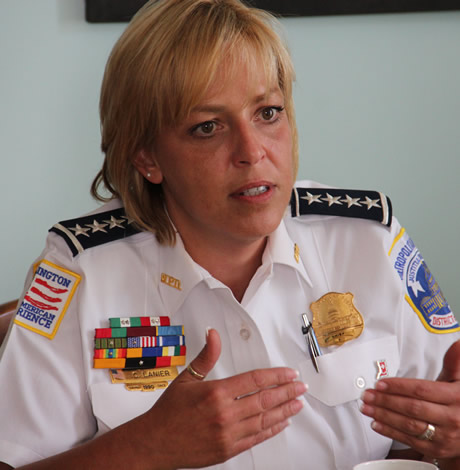Local
D.C. officer accused of anti-trans assault
Police chief says incident under investigation

D.C. police last week arrested a transgender woman for spraying a chemical repellent into the face of a man who she says called her names and assaulted her before identifying himself as an off-duty District police officer.
Chloe Alexander Moore, 25, was charged with simple assault following a 2 a.m. incident on Dec. 1 along the 1500 block of K St., N.W. According to court records, Officer Raphael Radon alleges that Moore squirted him with pepper spray in an unprovoked action following a brief exchange of words.
But two police sources said a sergeant and detective who responded to the scene determined through interviews with witnesses that Officer Radon initiated the altercation and may have committed a bias-related assault against Moore.
The police sources, who spoke on condition that they were not identified, said a night supervisor apprised of the incident by phone while at her office at the First District D.C. Police station overrode the recommendations of the sergeant and detective and ordered that Moore be charged with simple assault.
Officer Radon was not charged in the incident.
A police report filed in court identifies the supervisor as Capt. Michelle Williams, who was acting as the First District watch commander. The police sources said Williams gave the order to charge Moore in the case while speaking to officers on the scene by phone.
D.C. Police Chief Cathy Lanier said this week that the department’s Internal Affairs Bureau was investigating the incident.
“Both the officer and the arrestee received medical treatment in relation to the occurrence,” Lanier told the Blade in an e-mail. “Additionally, this matter was properly reported as per our protocols and is already under investigation. Rest assured we will also address these allegations in our investigation.”
Moore, whose legal name is Alexander Moore, was taken to the First District at 101 M St., S.W., for booking and later to George Washington University Hospital before being transferred to the police Central Cellblock at 300 Indiana Ave., N.W., where she remained until being taken to court.
Court records show she pleaded not guilty before a D.C. Superior Court magistrate and was released on her own recognizance. She was scheduled to return to court on Dec. 13 for a status hearing.
Moore told the Blade the incident began when she and a female transgender friend were walking along the 1500 block of K St., N.W., and crossed paths with the man later identified as Officer Radon. Moore said Radon was with two friends, a man and a woman.
“We didn’t have a lighter and we see a gentleman who had a cigarette lit,” Moore said. “My friend goes and asks for a light and he said, ‘Hey ladies, how you doing?’ And we said we’re doing fine.”
According to Moore, as Radon got closer to the two he realized they were transgender.
“He was like, ‘I’m not going to give you a light because you’re a man,’” said Moore, who added that Radon suddenly became hostile and began making disparaging comments about her appearance, especially the dress she was wearing.
“He said he could see my dick and my balls. And he was very hostile and angry and I was afraid of what he would do and then he pushed me,” Moore said. “Not knowing if he was going to really hurt me I got real scared and in self-defense I pepper sprayed him.”
Moore said she immediately ran from the scene, with Radon chasing after her for nearly two blocks.
“He grabbed the back of my neck and he throws me on the ground,” Moore said. “My midsection was on the curb and he puts his knee in my back real hard, and it caused a lot of pain.”
It was at that time, according to Moore, that Radon pulled out his badge and identified himself to her as a police officer. Within seconds, she said, uniformed, on-duty police officers appeared on the scene. Minutes later she said she was placed in handcuffs and a short time later placed inside a police car.
“We stayed out there about three hours after it occurred, waiting to see what was going to happen,” said Moore. “The police were talking among themselves and trying to make up their minds what they were going to do.”
She said the officers initially ignored her request that they call an ambulance to examine her because she was in pain from being knocked down by Radon.
Eventually an ambulance arrived, but she observed Radon getting inside and being taken away.
“He was saying his eyes were burning,” she said.
A police report filed in court says the incident began about 2:05 a.m. and that Moore was placed under arrest at 4:26 a.m.
“At approximately 0426 the undersigned officer was ordered to place D1 [Defendant 1] under arrest for simple assault,” says the report prepared by an officer identified only as B. Dass.
“The order was given by the 1D Watch Commander (Capt. Williams) through Lt. Dykes. “Then D1 was transported to 1D for further processing,” the report says.
The report gives Officer Radon’s account of what happened, saying he told an officer responding to the scene that he was approached by “two transgenders who engaged him and [Witness 1] and [Witness 2] in conversation.”
According to the report, Radon said the two transgender women asked him for a cigarette light and then asked him where he was going.
“It’s unclear which witness pointed across the street to a club,” the report says. “[Moore] then stated, ‘We have everything better than where you’re going for $10,” the report said Radon told officers at the scene.
“Officer Radon then told [Moore], ‘No thank you, I am not into guys.” “And told [Moore] ‘You don’t know who you’re talking to,’” the report says. “[Moore] then pulled out a can of pepper spray and sprayed Officer Radon in the face. Officer Radon then pulled out his MPDC credentials at which time [Moore] ran [eastbound] on K Street,” the report says.
“Officer Radon gave foot pursuit and then an apprehension was made in the 1400 block of K Street. Both Witness 1 and Witness 2 collaborated [Radon’s] statements,” the report says.
But the report says two other witnesses backed up Moore’s version of what happened. One of the two apparently is the transgender woman who was with Moore. The report, which does not identify any of the witnesses by name, suggests that Witness 3 may have been standing nearby and was not with any of the others involved in the incident.
“Witness 3 recounted the same story as D1 [Defendant 1—Moore],” the police report says.
Local attorney Dale Edwin Saunders, who practices criminal law in the District, described as “highly unusual” the decision by police and the United States Attorney’s office to charge Moore in the case.
“This person would have never been arrested or papered if the complaining witness had been a civilian,” Saunders said. “The defendant had two witnesses corroborating her version of the events.”
The U.S. Attorney’s office, which prosecutes most criminal cases in D.C., could not comment because it’s a pending case, according to spokesperson William Miller.
Moore, who said she’s unemployed, acknowledged that she had been arrested on an unrelated solicitation for prostitution charge on Nov. 20 along the 300 block of K St., N.W., in an area known to be frequented by transgender prostitutes. She called the arrest unjustified and said she is challenging it in court.
She said she’s also planning to file a police abuse complaint against Officer Radon and was in the process of seeking assistance from Transgender Health Empowerment, a transgender advocacy group.
Transgender activist Jeri Hughes, who is on the T.H.E. staff, said transgender women who can’t find work, often due to anti-transgender bias, sometimes turn to prostitution “to survive.” Hughes said the facts surrounding Moore’s interaction with Officer Radon strongly suggest her arrest was a “miscarriage of justice” and called on police to thoroughly investigate the incident.
Radon could not be immediately reached for comment.
District of Columbia
D.C. Black Pride theme, performers announced at ‘Speakeasy’
Durand Bernarr to headline 2026 programming

The Center for Black Equity held its 2026 DC Black Pride Theme Reveal event at Union Stage on Monday. The evening, a “Speakeasy Happy Hour,” was hosted by Anthony Oakes and featured performances by Lolita Leopard and Keith Angelo. The Center for Black Equity organizes DC Black Pride.
Kenya Hutton, Center for Black Equity president and CEO, spoke following the performances by Leopard and Angelo. Hutton announced this year’s theme for DC Black Pride: “New Black Renaissance.”
Performers for 2026 DC Black Pride were announced to be Bang Garcon, Be Steadwell, Jay Columbus, Bennu Byrd, Rue Pratt and Akeem Woods.
Singer-songwriter Durand Bernarr was announced as the headliner for the 2026 festivities. Bernerr gave brief remarks through a video played on the screen at the stage.
DC Black Pride is scheduled for May 22-25. For more information on DC Black Pride, visit dcblackpride.org.
Virginia
Arlington LGBTQ bar Freddie’s celebrates 25th anniversary
Owner asks public to support D.C.-area gay bars

An overflowing crowd turned out Sunday night, March 1, for the 25th anniversary celebration of Freddie’s Beach Bar, the LGBTQ bar and restaurant located in the Crystal City section of Arlington, Va.
The celebration began as longtime patrons sitting at tables and at the bar ordered drinks, snacks, and full meals as several of Freddie’s well-known drag queens performed on a decorated stage.
Roland Watkins, an official with Equality NoVa, an LGBTQ advocacy organization based in the Northern Virginia areas of Arlington, Alexandria, and Fairfax County, next told the gathering about the history of Freddie’s Beach Bar and the role he said that owner Freddie Lutz has played in broadening the bar’s role into a community gathering place.
“Twenty-five years ago, opening a gay bar in Arlington was not a given,” Watkins told the crowd from the stage. “It took courage, convincing, and a deep belief that our community belongs openly, visibly, and proudly,” he said. “And that belief came from Freddie.”
Watkins and others familiar with Freddie’s noted that under Lutz’s leadership and support from his staff, Freddie’s provided support and a gathering place for LGBTQ organizations and a place where Virginia elected officials, and candidates running for public office, came to express their support for the LGBTQ community.
“Over the past 25 years, Freddie’s has become more than a bar,” Watkins said. “It has become a community maker.”
Lutz, who spoke next, said he was moved by the outpouring of support from long-time customers. “Thank you all so much for coming tonight and thank you all so much for your support over the past 25 years,” he said. “I can’t tell you how much that means to me and how much it’s kept me going.”
But Lutz then said Freddie’s, like many other D.C. area gay bars, continues to face economic hard times that he said began during the COVID pandemic. He noted that fewer customers are coming to Freddie’s in recent years, with a significant drop in patronage for his once lucrative weekend buffet brunches.
“So, I don’t want to be the daddy downer on my 25-year anniversary,” he said. “But this was actually the worst year we’ve ever had,” he added. “And I guess what I’m asking is please help us out. Not just me, but all the gay bars in the area.” He added, “I’m reaching out and I’m appealing to you not to forget the gay bars.”
Lutz received loud, prolonged applause, with many customers hugging him as he walked off the stage.

In an official statement released at the reveal event Capital Pride Alliance described its just announced 2026 Pride theme of “Exist, Resist, Have the Audacity” as a “bold declaration affirming the presence, resilience, and courage of LGBTQ+ people around the world.”
The statement adds, “Grounded in the undeniable truth that our existence is not up for debate, this year’s theme calls on the community to live loudly and proudly, stand firm against injustice and erasure, and embody the collective strength that has always defined the LGBTQ+ community.”
In a reference to the impact of the hostile political climate, the statement says, “In a time when LGBTQ+ rights and history continue to face challenges, especially in our Nation’s Capital, where policy and public discourse shape the future of our country, together, we must ensure that our voices are visible, heard, and unapologetically centered.”
The statement also quotes Capital Pride Alliance CEO and President Ryan Bos’s message at the Reveal event: “This year’s theme is both a declaration and a demand,” Bos said. “Exist, Resist, Have Audacity! reflects the resilience of our community and our responsibility to protect the progress we’ve made. As we look toward our nation’s 250th anniversary, we affirm that LGBTQ+ people have always been and always will be part of the United States’s history, and we will continue shaping its future with strength and resolve,” he concluded.
-

 India5 days ago
India5 days agoActivists push for better counting of transgender Indians in 2026 Census
-

 Advice4 days ago
Advice4 days agoDry January has isolated me from my friends
-

 District of Columbia4 days ago
District of Columbia4 days agoCapital Pride reveals 2026 theme
-

 National4 days ago
National4 days agoAfter layoffs at Advocate, parent company acquires ‘Them’ from Conde Nast


















